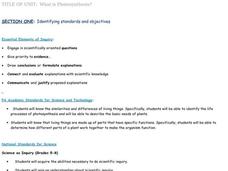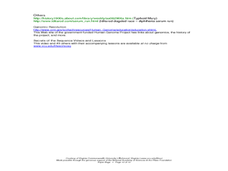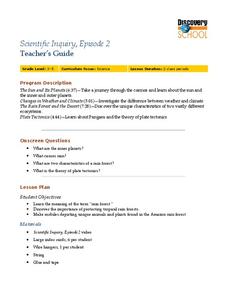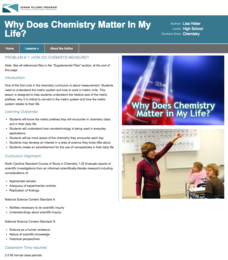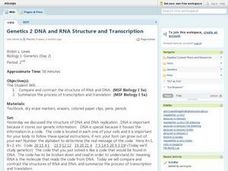Curated OER
Malaria Introduction
Learners analyze three different strategies for controlling the spread of malaria. They examine the disease and how people catch it. Learners explore the life cycle of the malaria parasite.
Curated OER
Galaxies
The first thing to note is that this lesson was written for use in a parochial school. Even if you are in a non-religious setting, however, the website exploration of galaxies and the accompanying worksheet make for an engaging...
Curated OER
Hurricanes
Young scholars research the formation and life-span of hurricanes and, after analyzing statistics, try their hand at plotting and predicting the course a hurricane.
Curated OER
Colds and Germs
Students determine how diseases are spread from one person to another. They investigate the importance of hand washing to reduce the spread of common colds and other diseases. They listen to teacher read alouds and complete an inquiry...
Curated OER
RAINFOREST Mini-Unit
Students engage in a variety of activities to investigate the subject of rainforests. The lesson focuses on the different floors of the rainforest and the types of life that exists on each.
Curated OER
What is Photosynthesis?
Students investigate the similarities and differences of living things. Specifically, students will be able to identify the life processes of photosynthesis and describe the basic needs of plants.
Curated OER
Introduction to Biomes
Eighth graders identify the different kinds of biomes. In this life science instructional activity, 8th graders explain their importance in an ecosystem. They take a BrainPop quiz at the end of the instructional activity..
Curated OER
The Secrets of the Sequence
High schoolers explore genetics using a series of selected videos. In this biology lesson series, students study the different advances in life sciences. They research the pros and cons of genetic research.
Curated OER
Rain Forest
Young scholars study the Amazon tropical rain forest. In this rain forest lesson, students discuss the Manu Biosphere reserve and watch a video about conserving the rain forest. Young scholars create mobiles for the rainforest that...
Curated OER
Butterfly Round-Up
Students classify the characteristics of butterflies and moths moths. In this life cycle lesson plan, students identify butterflies and moths common in the state of Iowa as well as their characteristics. Students then learn the proper...
Curated OER
From Egg to Butterfly
Students use file folders and art supplies to create a visual presentation of the life cycle of a butterfly. For this life cycle lesson plan, students read books about the life cycle and view the life cycle with in class habitats.
Curated OER
Properties of Soil
Fourth graders conduct investigations to test different types of soil from different regions of Texas. They make comparisons and identify the characteristics of the soil. The end product of the inquiry is a student report.
Curated OER
Mitosis & Cell Processes
Students research the process of mitosis and how it progresses to the finished result of cell division. They reflect upon how this causes organisms to grow larger and helps tissues to be renewed.
Curated OER
HIV Prevention
Seventh graders engage in critical thinking skills about personal health and safety to prevent the acquiring of the HIV disease. The project is an extension of this thinking designed for students to think about all the different ways...
Kenan Fellows
How Do Chemists Measure?
Young chemists create gold nanoparticles as they learn to measure accurately with the metric system. They create an advertisement for the application of nanotechnology to complete the first lesson in a series of six.
University of Minnesota
What's the Deal? Addiction Card Game
Addiction is a big deal! Playing a game of cards helps learners understand the concept of addiction. Through their analysis, they examine the potential for addiction and how it varies for each individual.
Science 4 Inquiry
The Real Story of Where Babies Come From
Pupils learn about both male and female anatomy before understanding how they work together to make a baby. Scholars discover new vocabulary, create a presentation on fertilization, and discuss related topics.
NASA
A Different Perspective
What can we learn from the data? Young scholars analyze actual solar data to answer specific questions. The activity presents an opportunity for an open-ended investigation of the data to conclude a five-part series on solar winds.
Baylor College
Water in Your Body
Do you know how much water you have had in the last 24 hours? Do you know how much your body needs? In this hands-on activity, your class members will estimate how much water our bodies lose each day by filling and emptying one-liter...
Mathematics Vision Project
Quadratic Functions
Inquiry-based learning and investigations form the basis of a deep understanding of quadratic functions in a very thorough unit plan. Learners develop recursive and closed methods for representing real-life situations, then apply these...
Curated OER
The Tadpole and the Frog
First graders examine the life cycle of the frog, and research frogs of the Nez Perce reservation and their requirements for survival. They observe the development of frog eggs and record their observations in science journals.
Curated OER
Exploring the Beach
Students explore the beach. In this marine habitat instructional activity, students inspect sand grains, design beach profiles, classify marine life, and examine natural beach habitats. Students use spreadsheets to record data from their...
Curated OER
Hopper Hunt: IPM Decision-making in Alfalfa
Learners describe migrations and life cycle pattersn of a key alfalfa pest, the Porato Leafhopper. They define the Economic Inquiry Level and Economic Threshold. Students evaluate data in relation to profit as it applies to IPM. They...
Curated OER
DNA and RNA Structure and Transcription
Students compare and contrast the structure of RNA and DNA.They summarize the process of transcription and translation. The instructional activity uses an inquiry model and the use of codes in DNA.
Other popular searches
- Life Science Inquiry Fossils
- Life Science Inquiry Frogs
- Life Science Inquiry Lessons
- Life Science Inquiry Labs
- Life Science Inquiry Mammals
- Life Science Inquiry Chicken
- Inquiry Based Life Science







